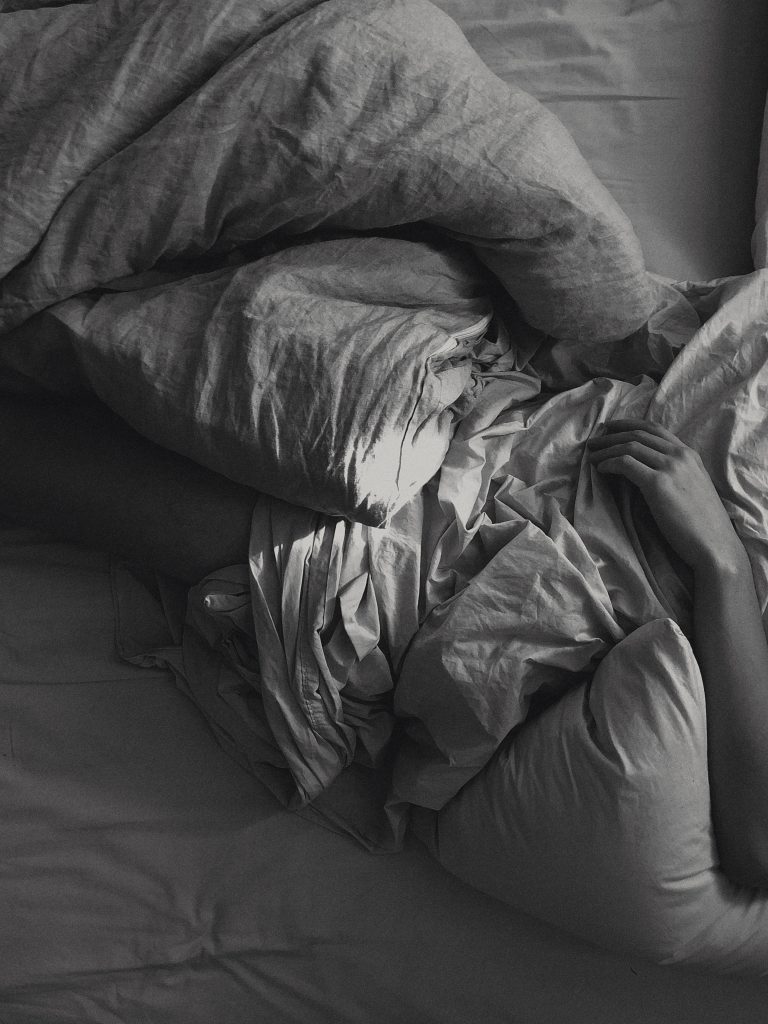
Sleep can feel like an elusive beast and yet we spend approximately a 3rd of our life asleep. That’s not only a long time. But a large amount of time to invest if we’re not actually getting the benefits. We need it to recharge ourselves. When we achieve deeper sleep, with no eye or muscle activity, we become less responsive to outside stimuli and are able to restore our bodies. During this sleep stage our body repairs muscles and tissue. As well as boosting our immune function, building energy and stimulating growth.
This stage is followed by REM (Rapid Eye Movement) sleep when we are most likely to dream. During REM our eyes move quickly in different directions; hence the name. But our heart rate and blood pressure also increase. Our breath becomes faster and shallower. And it’s in this sleep type that our brain consolidates and processes information from the day and stores it to our long term memory.
So, sleep is good for us (more on that later), it’s a biological need. But so many of us aren’t getting enough of it. We know that as adults we need between 7 – 9 hours of sleep and yet in a recent study (The Great British Sleep Survey 2020) only 11% of British adults said they regularly sleep soundly through the night. The study also found that 36% struggle to fall asleep quickly, 41% wake up frequently during the night and 45% still feel tired when they wake up.
The Sleep Benefits
Before we uncover the mysteries of a good night’s sleep, let’s look a bit more at the why? Personally, we may want to feel more rested or energized. We might be fed up with staring at an alarm clock in the early hours. Or hate the struggle to get back to it when we are woken up. But we also know there are specific health benefits. Poor sleep is linked with weight gain and short sleep duration is a risk factor for obesity. It’s thought this is due to needing more energy so consuming more calories to get through the day.
As we’ve seen earlier, sleep is important for our brains and can improve cognition, concentration, productivity and performance. Both mental and athletic. Our sleep can also have an impact on chronic diseases and sleep restrictions can impact blood sugar, reduce insulin sensitivity, and decrease immune function. It’s not only good for our physical health but also our mental health. Poor sleep is linked to depression and anxiety.
It’s important to note here that health problems linked to poor sleep are only correlations and not causations. We need to take all of this on a case by case basis. There’s no foregone conclusions here. And therefore no need to panic. But on the off chance you’re the rare person who doesn’t want a good night’s sleep there’s a persuasive argument for one!
Snoring Keeping You Awake?
A good start to working out how to improve our sleep is acknowledging the obstacles. These will be individualized too. But it’s important to give it some thought. You may want to sit down and think this through or even write it down. Perhaps track it over a few nights and try and pinpoint, where possible, what is keeping you awake or even what is waking you up?

A 2018 UK Sleep Survey discovered that children were actually not as responsible for a lack of parental sleep as we may first assume. The research found that people ranked stress (more here on stress management) as the number one guilty party for preventing sleep with 1 in 4 believing it impacts their sleep quality. Other culprits included noise, their health, partners disturbing you and too much caffeine. In that order. If any of these resonates with you, we’ve got a starting point to work from.
Sleep Hygiene
Sleep hygiene is the methods or practices we use to help us achieve a good night’s sleep. There’s a range of things we might try and I’ve tried to list a wide variety below. It may take some time for us to find what works for us so you may want to dip in and out and try a few different things. According to Psychologist Philippa Lally in the European Journal of Social Psychology, it can take up to 66 days to form a habit. With this in mind, decide what you’d like to try and make sure you give it long enough to take effect.
If we don’t stick to it, we risk missing out on something that could be truly helpful. You may wish to try things one at a time, an arduous process but worth it! So you can narrow down what is or isn’t working. Or you may wish to try multiple at a time, quicker definitely, but you won’t be able to pinpoint which practice really works for you. And as usual, if you and your family are trying things out remember this is individualized. There’s no one size fits all.
1. Start Off on the Right Foot
It may seem strange to think about your morning when considering bedtime. But the way we start the day sets us up for the day and therefore impacts the way we end it. For example, a Harvard sleep study found it can take 2-4 hours to be fully awake in the morning. Giving ourselves ample time to wake up and be ready for the day. Instead of rushing can mean we’re less reliant on caffeine which when consumed in the afternoon can still impact our sleep hours later.
2. Routine, Routine, Routine
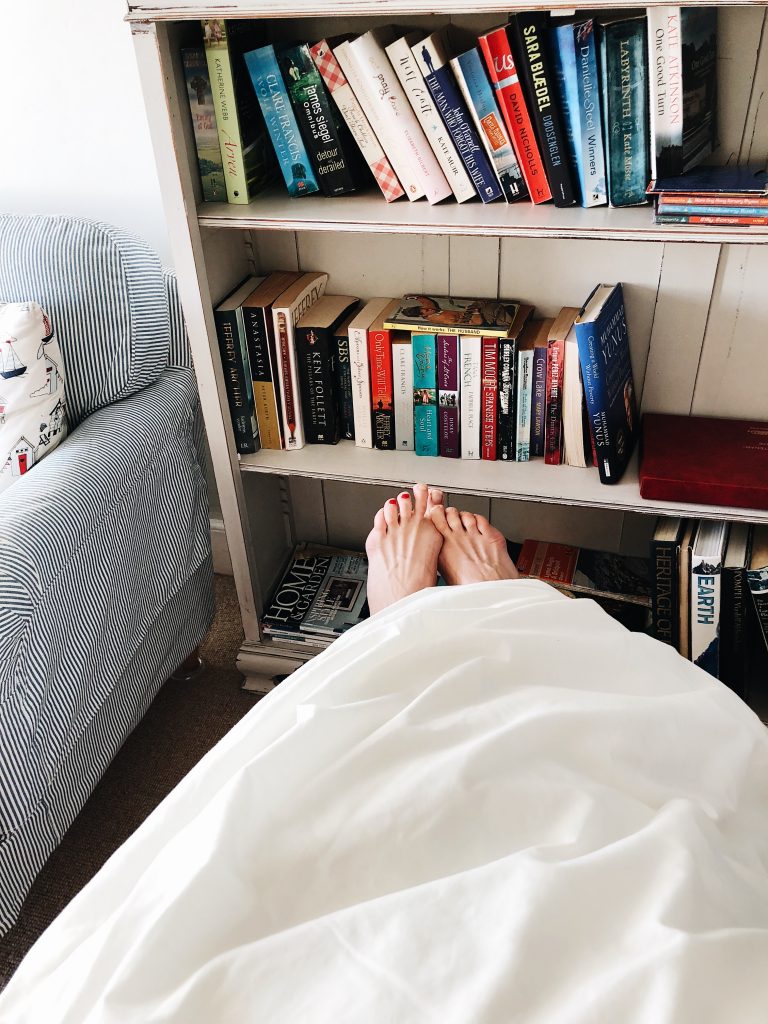
A sleep routine can not only help us unwind before bed but also calm and ground us. When we’ve had time to process our thoughts and put the day aside we’re less likely to be kept up by thoughts or concerns. It will also help with those pesky stress levels. Part of our sleep routine may include but not be limited to: a skincare routine, brushing our teeth, relaxing showers or baths, moisturizing, listening to music or podcasts, reading a book, mindfulness (more here), deep breathing or yoga. Included in my own routine is a bubble bath, essential oils, a pillow spray and listening to nature sounds as I drift off.
3. Get It On Paper
If you’re the type who has whirling thoughts the minute your head hits the pillow – guilty as charged – this might help. Get all those thoughts out your head before bedtime. And, if need be, keep paper and pen by your bed. If something pops up and will keep you awake you can easily write it down and fall asleep safe in the knowledge you won’t forget. For a more ‘modern’ take on this, we have a Google Home in our room. If I remember something whilst trying to fall asleep I’ll ask Google to remind me to do it tomorrow. In a similar vein, planning for the next day can also help us feel prepared and less worried about forgetting something when it’s bedtime.
4. Beware the Blue Light
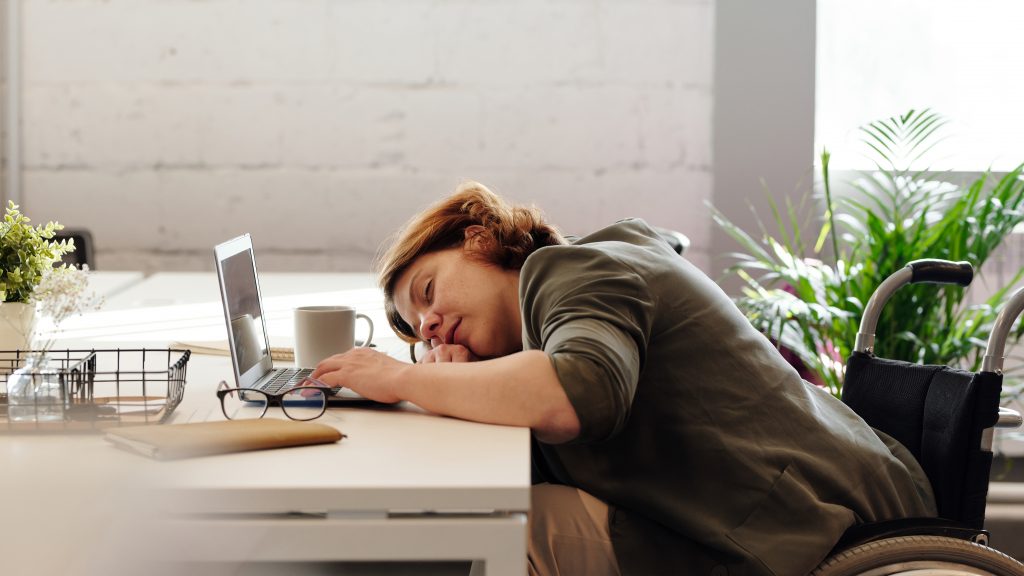
Many of us know or have heard that using technology before bed can prevent us getting a good night’s sleep. Historically, pre-technology and artificial lighting, we would go to bed in darkness and wake up with the sun. The onset of darkness would trigger the release of our sleep hormone melatonin. And the arrival of sunlight would suppress melatonin and wake us up. Nowadays, all the artificial light and technology suppresses melatonin and makes us less sleepy at bedtime. Hence the importance of low lighting and getting off the technology at least an hour before bed. If that feels too difficult there are numerous apps, for example f.lux, which can reduce blue light on our screens – a handy 21st century work around!
5. Sleep Patterns
Where possible we should aim to go to bed and get up at the same time every day. It’s not enough to simply get the hours in but also to regulate them. This helps set our internal body clock – to maximize this further aim to go to sleep when you’re tired. If this is the middle of the afternoon and not at bedtime think about why this may be? Likewise, to keep this pattern it’s best not to lie in or chop and change too much. This gives us a jet lag feeling. And may explain why you still feel exhausted on the weekend if you’re aiming to catch up from a week of no sleep! If you do feel tired replace a lie in with a short (15-20min) daytime nap before 5pm to avoid preventing sleep that night.
6. Optimize Sleep Arrangements
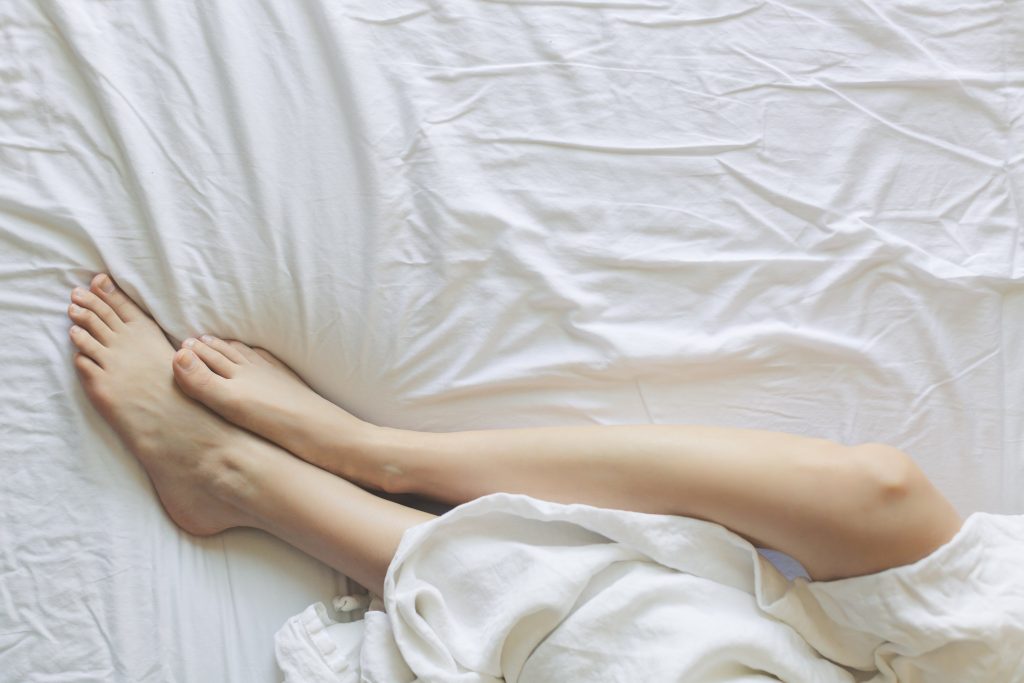
We can optimize our sleeping environment to maximize our sleep. To do this think about noise and how to eliminate it – this may be difficult if the source of the noise is your partner! We can also think about temperature, it’s thought optimal is 18 degrees Celsius, as well as our actual bed and bedding. Is it comfy enough? Do we feel our back and neck is supported? Are we too cool or hot?
7. Sleep (& Sex) Only Zone
Our brain creates associations so it’s important that our bed is viewed as a place of sleep. Think about all the activities you may do in bed. When you get into bed, your brain is wondering which of the many things you might be about to do. Try to eliminate the options so your brain mentally prepares for sleep when you get into bed. This will mean stopping watching TV or using computers in bed – a challenge for many of us. It’s less problematic to do unwinding, non-tech activities before bed e.g. reading or writing in a diary.
8. Acknowledge the Impact of Stimulants
I’m not going to advise you one way on the other on these. I’m not a healthcare professional and I don’t know your individual circumstances. But it’s important we make informed choices. We may want to consider that caffeine, despite feeling like the only thing to get us through the day, can disrupt sleep up to 10-12 hours after drinking it. So, it’s best to avoid it 4-6 hours before bedtime. Smoking and alcohol will also have an impact. Smoking is a stimulant and whist alcohol may make you feel tired it will disrupt your sleep cycle. It’s a good rule of thumb to avoid heavy meals and rich food up to 2 hours before bed. If you do need a snack think of plainer and simple alternatives which won’t be such a burden on your digestive system. Or perhaps have a drink – water is best – instead?
9. Restless Sleep
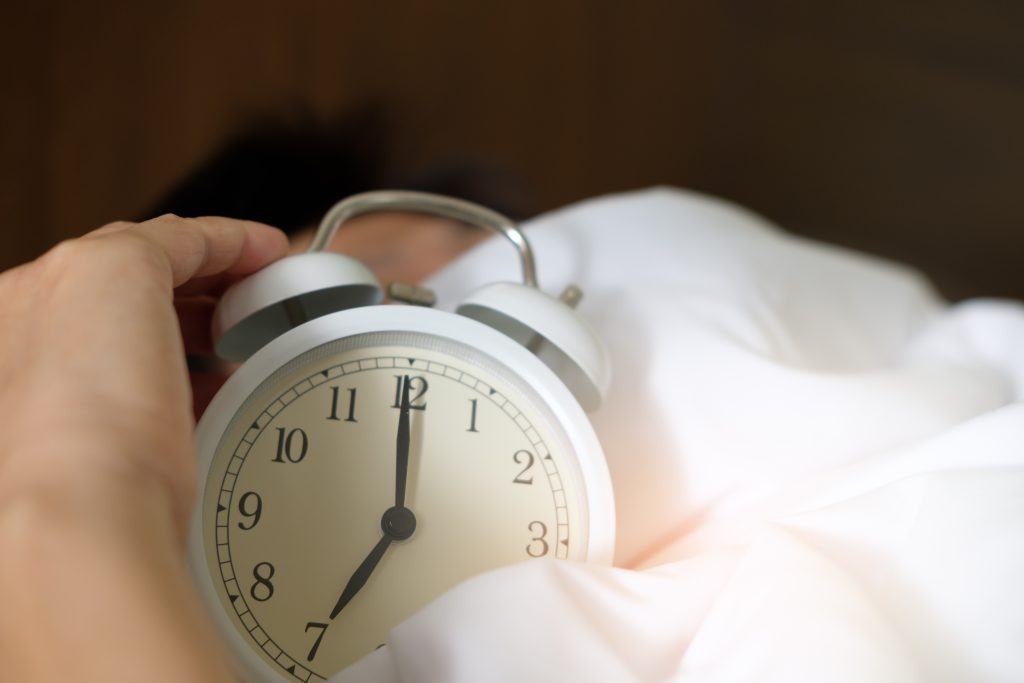
If you find yourself waking up in the middle of the night, there’s nothing worse than staring at the alarm clock watching the minutes tick by. And counting how much longer you have to sleep before you need to wake up. Instead, give yourself 20 minutes to try and drift off. If this doesn’t happen, rather than stay in bed, get up and do a quiet and restful activity – perhaps something from your bedtime routine – in dim lighting. When you feel tired head back to bed.
10. Look After Ourselves
Generally keeping an eye on our health can help with sleep. Both exercise and spending time outside can help reduce stress and in the case of outdoors regulate our circadian rhythms. As natural sunlight will help us stay awake, so too darkness will make us sleepy. So we can harness nature to help us out. Daytime bright light exposure is a proven treatment for those with insomnia and can improve sleep quality and duration as well as reducing the time it takes to fall asleep by 83%. Whilst these activities are good for both physical and mental health and will help us sleep. Some health conditions can also be an obstacle. If you think this may be the case, seek support and health advice from medical professionals if lack of sleep is making life difficult and impacting your mood and health or vice versa.
What are your tips and tricks for a good night’s sleep? Let us know below.
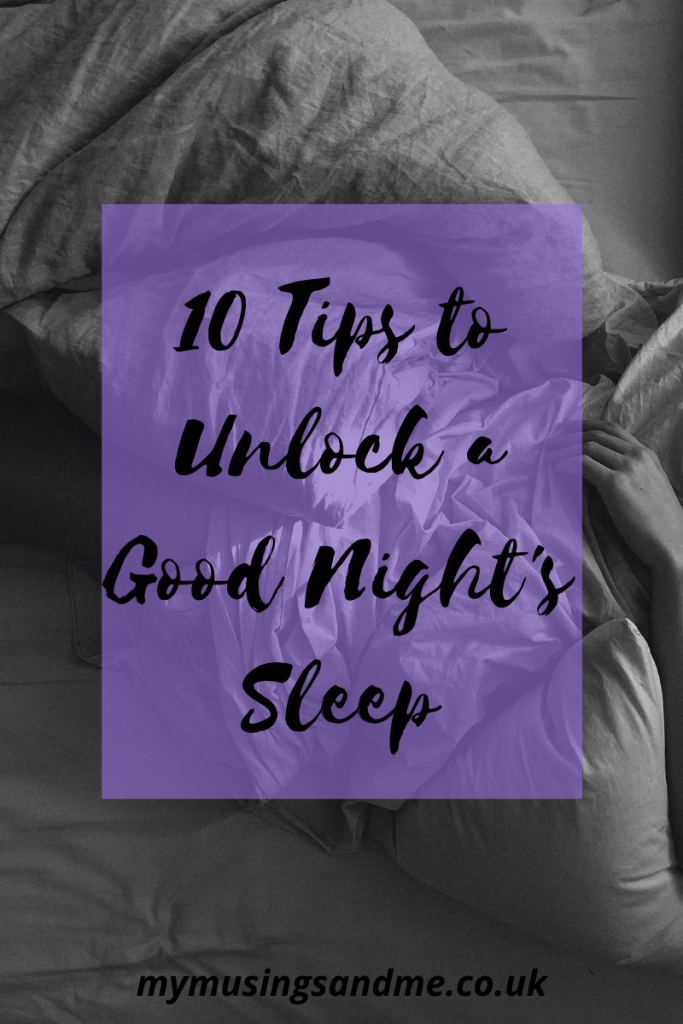

A lot of great tips here. I’ve had to be especially vigilant with getting any thoughts down on paper lately in order to get to sleep. I’m finding that reading helps too.
Very useful post. Afterall, sleep is the best mediation.
Good tips. Caffeine definitely affects my sleep.
Amazing tips. Sleep is very important as its a source of deep relaxation and rest after an exhausting day.
This is a really interesting post! It’s crazy to think just how much can affect our sleep pattern. I like the idea of taking it slower in the mornings to reduce the amount of caffeine I need in the day!
This is a really helpful and interesting post. Thank you for sharing these tips!
Lauren | http://www.bournemouthgirl.com
Hi Emma. Great article on an often overlooked topic. If we all focused a little more on our sleeping habits I’m sure that we’d feel better for it.
These are all such great tips! I have been struggling to sleep recently but I think it is because I work shifts so some weeks I can be starting as early as 0600 and other days I don’t finish work until 0400. It has completely ruined my sleep pattern. I had no idea though that it can take as long as 4 hours for us to be completely awake! I will need to keep this in mind. I am also trying my hardest not to use my phone while in bed and at least having a routine when I wake up and before I go to sleep. So even thought I am not always sleeping at the same times I have some sort of a routine that might help.
I always have trouble sleeping so I am excited to try out some of these techniques to help improve on my sleep. It is crazy to think about how much of our lives we spend asleep.
So true we spend so much time doing it, it’s a shame not to make the most of it! I’m working on another post about products that help me sleep so keep an eye out!
This is a really helpful post. I work shifts so I sometimes can struggle to get a good sleep, I will definitely be trying out some of these tips.
Thanks Sarah! I really hope that they help and you find what works for you!!!
Great tips! I love sleep and I definitely think I’ve perfected my sleep routine but I always go through phases of having really bad sleep too so sticking to a routine is definitely important!
I couldn’t agree more. I often still have some sleepless nights (an 8 month old doesn’t help!) but the routine helps me stay grounded and relaxed
These are great tips! I’m terrible about looking at my phone until I fall asleep with it and it hits me in the face. There is nothing like a good night’s sleep. I’ve pretty much nailed down my nighttime routine. It does however involve a hot cup of warm milk and Suisse chocolate mocha., but it ous me right to sleep.
That sounds amazing! I used to have a warm tea before bed but that seems to have got lost on the way! I’m currently trying out dinner, a warm bath and then reading in bed til I fall asleep!
You’ve listed all the great tips. I use most of these to have a quality sleep. I guess i’d add avoid eating before bedtime. That’s a no no and will keep you up all night! Thank you for this post, great advice!
So true! Falling asleep on a full stomach is not a recipe for a good nights sleep!
I’ve never drank tea or coffee and almost never have anything that has caffeine in it, and yet, I still have trouble sleeping, which just isn’t fair. Over the last 8 months or so, I’ve started having broken sleep, and I have no idea why.
I used to have to write my thoughts down before trying to sleep when I was still struggling with my childhood trauma, but now my mind will just make random tunes to keep me awake, so I sleep with the TV on instead
I’m so glad you’ve found something that works for you. I definitely have found that at different points in my life sleep has been harder to come by for different reasons. And my approach has had to be different too
Thank you so much for these tips! I’ve been struggling to get a good night’s sleep lately. Journaling before bed really helped me get all the thoughts out my head. It’s such an amazing positive habit to clear your mind.
100% I find it so hard to sleep when something is bothering. And I have to let it out by writing or talking about it. Only then can I fall asleep
Grest advice! A good routine certainly helps.
It’s weird but I soak lettuce leaves in boiling water for a couple of minutes, let it cool and then drink it before bed. I don’t know what’s in it, but it works like a charm.
This was a really good blog post Emma. Exercise and outdoor nature activities are great for mental health and consequently lend to a good night’s sleep.